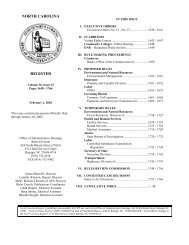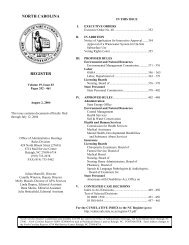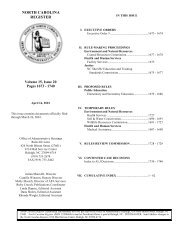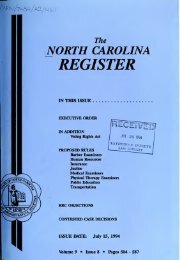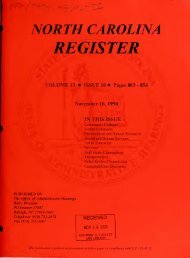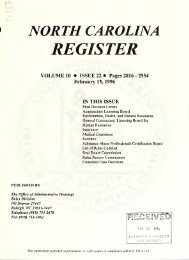NC Register Volume 19 Issue 06 - Office of Administrative Hearings
NC Register Volume 19 Issue 06 - Office of Administrative Hearings
NC Register Volume 19 Issue 06 - Office of Administrative Hearings
Create successful ePaper yourself
Turn your PDF publications into a flip-book with our unique Google optimized e-Paper software.
RULES REVIEW COMMISSION1 <strong>NC</strong>AC 41C .0104: Department <strong>of</strong> Administration - The Commission objected to the rule based on lack <strong>of</strong> authority for the rule. Initems (17) and (18) there is a requirement that a person be a licensed pr<strong>of</strong>essional engineer or architect to be a “technical analyst” or toperform a “technical analysis.” There is no authority cited to require such a job qualification. It is unknown, for the purpose <strong>of</strong> thisanalysis, whether such work would be classified as the practice <strong>of</strong> engineering or architecture such that an occupational license wouldbe required to perform the work. Even if it were, then it is the responsibility and authority <strong>of</strong> the licensing board to enforce thatoccupational license. There is no authority cited here for the Department <strong>of</strong> Administration to enforce either <strong>of</strong> those occupationallicenses.1 <strong>NC</strong>AC 41C .0201: Department <strong>of</strong> Administration - The Commission objected to the rule based on ambiguity. The first sentence <strong>of</strong>this rule provides that the eligibility within this rule is “in descending order <strong>of</strong> priority.” There are two problems with this. The firstproblem is that it may be unclear whether the order is simply the two separate numbered classes listed in the rule and that order withinthose numbered classes does not affect priority. One would assume that it is only the numbered classes that are first and secondpriority and that there are no further ordering. But that is not stated and may be a source <strong>of</strong> confusion. However the more difficultproblem is that neither this rule nor any other rule appears to set the standards for how the priority is applied. In other words do all theapplicants in the first group get their loans (if they meet the qualifications) before any <strong>of</strong> the applicants in the second group, or areother standards at work also? The rules do not seem to set any standard for determining how the priority is to be applied. It is alsounclear how a “local government organization” in item (2) can “translocate” to North Carolina. Presumably all local governments thatthis rule would apply to are already located within the state. Partly because <strong>of</strong> that lack <strong>of</strong> clarity, this part <strong>of</strong> the rule then becomesunclear in whether the emphasis <strong>of</strong> the rule is on the fact that some entity is “translocating” or whether the emphasis is on the fact thatthis item applies to planned construction only and not to a building already in existence, or both aspects together.1 <strong>NC</strong>AC 41C .0202: Department <strong>of</strong> Administration - The Commission objected to the rule based on lack <strong>of</strong> authority and ambiguity.In (3) it is unclear what is meant by the apparent rule criteria “to keep interest rates low.” It is unclear what is meant or required bythis criteria and it is unclear what is the relationship between keeping interest rates low and the other part <strong>of</strong> this rule specifying amaximum total loan indebtedness. In item (4) it is unclear what constitutes or is meant by “proven reliable commercially availabletechnologies.” It is unclear what standards are to be used by the State Energy <strong>Office</strong> in “recognizing” such technologies. To the extentthat such recognition is based on standards set outside rulemaking, there is no authority for that method <strong>of</strong> setting standards.1 <strong>NC</strong>AC 41C .0209; .0302; .0303: Department <strong>of</strong> Administration - The Commission objected to these rules based on lack <strong>of</strong> authority.The Commission has objected to rule .0104 because the agency has not cited any authority to require that only certain licensed personsperform the “technical analysis” work. By requiring, in .0209(2), .0302(2), and .0303(4), that the final technical analysis report mustinclude the “pr<strong>of</strong>essional registration seal affixed” to the report, this rule continues that requirement. There is no authority cited forrequiring the work to be done by certain licensed pr<strong>of</strong>essionals. The agency does have the authority to require that it be sealed if it isprepared by one <strong>of</strong> those pr<strong>of</strong>essionals or to require that the qualifications <strong>of</strong> the person preparing the report be listed. But that is notthe same as requiring that a certain pr<strong>of</strong>essional prepare it.1 <strong>NC</strong>AC 41C .0301: Department <strong>of</strong> Administration - The Commission objected to the rule based on ambiguity. It is unclear who orwhat constitutes a “qualified third party technical analyst.”4 <strong>NC</strong>AC 03B .0103: <strong>NC</strong> Banking Commission – The Commission objected to this rule based on lack <strong>of</strong> authority. The last sentencein paragraph (b), lines 12 and 13, requires anyone making an oral presentation before the Banking Commission, including apresentation at public hearings, to “submit a written copy <strong>of</strong> the presentation” to the rulemaking coordinator. It does not seem that theBanking Commission has the authority to require that any oral comments made at a public hearing be reduced to writing. Theycertainly have not cited any. It seems to the RRC that the point <strong>of</strong> a public hearing is to give people the opportunity to appear beforethe rulemaker without having to reduce that appearance to writing. It would also appear to limit a person’s oral comments to whateverwas prepared in writing ahead <strong>of</strong> time. It is unclear how a person would be able to submit written comments contemporaneously withhaving just spoken them, if they varied from the written submission. The statutory authority cited includes the <strong>Administrative</strong>Procedure Act. That portion <strong>of</strong> the APA requires the rulemaker to “consider fully all written and oral comments received.” [Emphasissupplied.] If they failed to consider oral comments because they were not accompanied by written ones, they would be violating thisprovision. The same would apply if they did not allow someone to speak because they did not have written copies <strong>of</strong> their comments.11 <strong>NC</strong>AC 01 .0425: Department <strong>of</strong> Insurance – The Commission objected to the rule due to ambiguity. In (a), it is not clear whatstandards the hearing <strong>of</strong>ficer will use to determine “timeliness”. The objection applies to existing language in the rule.12 <strong>NC</strong>AC 07D .0903: <strong>NC</strong> Private Protective Services Board –The Commission objected to the rule due to lack <strong>of</strong> statutory authority.There is no authority cited to charge a new certified trainer a certification fee as well as an application fee. G.S. 74C-9(e)(9) and (10)authorize the fees. Item 9 allows the application fee <strong>of</strong> up to $50. Item 10 allows a renewal or replacement fee <strong>of</strong> up to $25. Theredoes not appear to be authority to charge the second fee for a new certificate. This objection applies to existing language in the rule.<strong>19</strong>:<strong>06</strong> NORTH CAROLINA REGISTER September 15, 2004641




